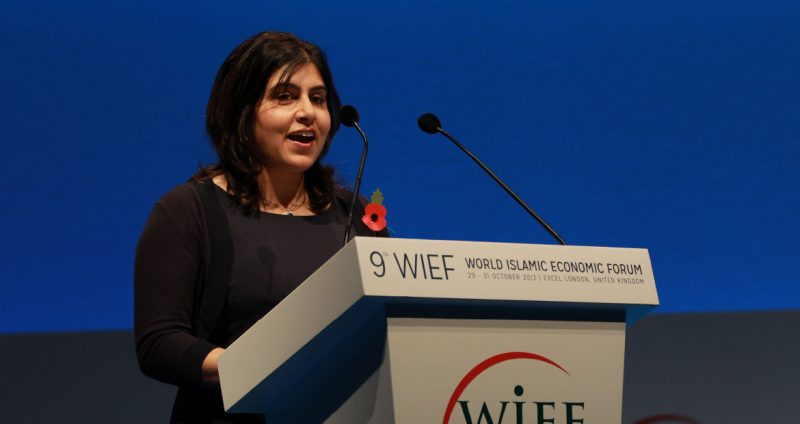Setting the benchmark for financial-sector governance
A look into how the UK has adapted its laws to accommodate Islamic finance products, and its leading role in setting standards for governance outside the Muslim world.
Ask any central bank or financial regulator from the non-Muslim world who they follow in terms of Islamic banking regulatory or supervisory infrastructure, and almost inevitably the answer will be the UK and the Bank of England. The UK model for authorising deposit-taking Islamic financial institutions is now part of the architecture of the global Islamic financial system; there are two primary reasons for this. Firstly, the UK’s model is now proven through six authorised banks operating not only under Sharia principles, but also under the UK Banking Act and subsequent European Union directives. Secondly, the UK has set the precedent of regulating and supervising such institutions in a non-Muslim legal jurisdiction. This is in addition to another 20 or so financial institutions in the City offering a motley of Islamic financial products through Islamic Banking Windows or special departments.
Ironically, a number of Muslim jurisdictions partly or largely follow the UK’s lead and English law, with its basis in common law and its freedom to contract (which is also a cornerstone of Islamic law). English law is widely accepted as the ‘law of choice’ for most international Islamic financial transactions, including commodity murabaha, syndicated murabaha, sukuk (or Islamic trust certificates), real estate investment trusts (REITs) and leasing contracts.
Leveraging expertise
Not surprisingly, London-based law firms ranging from Clifford Chance, Linklaters, Norton Rose Fulbright, Trowers & Hamlins, Simmons & Simmons, Stephenson Harwood, Ashurst and KL & Gates have amassed an expertise in Islamic finance transactions and documentation that is the envy of the world.
The same applies to accounting and financial reporting, as well as advisory services, in which KPMG, EY, PwC and Deloitte have played major roles. They have helped to develop accounting standard-setting bodies for the Islamic financial industry, in particular the Accounting and Auditing Organisation for Islamic Financial Institutions (AAOIFI), based in Bahrain. Much of the credit for putting UK plc on the Islamic finance map must go to Eddie George, who as Governor of the Bank of England in the 1980s and 1990s, laid the ground work for the development of UK Government policy on Islamic finance. George was later assisted by Howard Davies, chief executive officer of the Financial Services Authority (FSA), which was set up in 2001 specifically to deal with authorisation and regulation of the industry.
“In 2000,” explains Stella Cox, managing director of London-based DDCAP Limited – one of the more established intermediation and commodity brokerage firms, having served the global Islamic finance industry for nearly two decades – “Andrew Buxton, former chairman of Barclays Bank, and Governor Eddie George of the Bank of England co-chaired a working group established to promote the development of the UK’s Islamic financial services proposition. The group included representatives from then regulator the Financial Services Authority, HM Treasury and the Council of Mortgage Lenders and, with added political and regulatory support, momentum in the UK Islamic finance industry began to build.”
In the UK, explains Cox, there is no separate regulatory framework for Islamic financial services, but, for over a decade, the relevant UK authorities have engaged in initiatives to review and address impediments to the further development of the industry. During that time, six wholly Sharia-compliant banks have been authorised, legal and taxation reforms have ensured that Sharia-compliant financing contracts and sukuk can be offered or issued on terms equivalent to conventional alternatives and Islamic mortgages have become available.
Indeed, to date,
some 49 sukuk have been listed on the London Stock Exchange (LSE), raising over USD 34 billion,
including the first sukuk in the world with a face value in excess of USD 1 billion. Two Islamic exchange-traded products and seven exchange-traded funds (ETFs) are also quoted on the LSE. The total size of Sharia-compliant assets in the UK financial sector is estimated in excess of USD 18 billion.
This policy was confidently pursued by the successive Blair Labour Party administrations of the 1990s and was fine-tuned by then-Chancellor of the Exchequer Gordon Brown under the Labour Government’s Financial Inclusion policies. Through subsequent amendments and inclusions in successive finance bills, the UK built up a corpus of enabling laws that, in some respects, was once again pioneering. An example of this leadership was seen in the introduction of tax-neutrality measures in legislation for Islamic financial contracts, such as housing mortgages based on ijarah (leasing) and diminishing musharakah (diminishing equity), which had the same end economic effect as conventional mortgages, thus creating a level playing field for equivalent products serving both financial systems.
Here, the UK Finance Bill removed the double stamp duty requirement on such mortgages because of the structure of the Islamic contracts (which involved two separate contractual stages in terms of ownership of the title deeds). This step was taken because the previous system was deemed to be unfair to anyone who took out such a mortgage.
Several jurisdictions, both in Muslim and non-Muslim countries, have subsequently followed the UK example by introducing similar amendments to their laws, especially relating to land-based financial transactions whether for mortgages, other real estate structures, including REITs, or sukuk. Tunisia and Hong Kong are the latest two countries to introduce such laws, which came into effect in June this year.
Governor Eddie George was also a major influence in helping to steer Muslim countries such as Saudi Arabia, the United Arab Emirates (UAE), Bahrain, Kuwait and Malaysia, and multilaterals such as the Islamic Development Bank, towards developing and introducing mechanisms for the management of Islamic bank reserves and short-term liquidity in a nascent inter-bank and money market.
An encouraging aspect of the UK policy on Islamic finance is its sustainability. The policy has support from all major political parties – the Conservatives, Labour and the Liberal Democrats – and it is their stated ambition to develop London as an international hub for Islamic trade, investment, banking and finance education.
The UK’s role in broadening access
Earlier this year, the UK business, skills and innovation secretary, Dr Vince Cable, reassured the attendees of a reception on Islamic finance at the Palace of Westminster (organised by law firm Norton Rose Fulbright) that “Islamic finance can help to promote growth in the UK economy and provide much-needed revenue and investment at a time when conventional liquidity is in short supply.
“In the current economic climate, there is merit in exploring alternative forms of funding, and harnessing Islamic finance could be a source of enormous benefit to the UK. London is recognised as the international centre for Islamic finance because of our ongoing commitment to policies that will help create a level playing field for both retail and wholesale Islamic finance. is has resulted in the UK becoming the number-one jurisdiction in the Western world in terms of Sharia-compliant assets,” he added.

This Coalition Government’s commitment to developing the Islamic finance market in the UK was reiterated by Baroness Warsi, senior minister of state at the Foreign and Commonwealth Office and minister for faith and communities, in a recent speech in Oxford. The UK Government, Warsi maintained, “will support the Islamic finance industry in its aim to broaden the range of products and services, reducing the risk of over-exposure and ensuring that high-quality Islamic [product] alternatives are available to [UK] customers. The government’s role is to create the regulatory and tax frameworks to allow the market to thrive, and, ultimately, help to produce the growth that Britain needs. By championing Islamic finance, I believe we are doing just that.”
On the international front, too, the UK plays an important role in supporting initiatives designed to ‘mainstream’ Islamic finance in the international financial system. Earlier this year, the Group of Governors and Heads of Supervision of the world’s top banking regulators launched the ‘Basel III: the Liquidity Coverage Ratio (LCR) and Liquidity Risk Monitoring Tools’ standard at a meeting chaired by then-Governor of the Bank of England, Sir Mervyn King.
One of the key reforms of the Basel Committee on Banking Supervision – a grouping of supervisory authorities – is the LCR standard. e standard is aimed at developing a more resilient banking sector, with the central objective of promoting the short-term resilience of the liquidity risk profile of banks. It does this by ensuring that banks have an adequate stock of unencumbered high-quality liquid assets (HQLA) that can be converted easily and immediately in private markets into cash to meet their liquidity needs for a 30-calendar-day liquidity stress scenario.
The Basel Committee, encouraged by the UK and others, allowed “national supervisors in jurisdictions in which Sharia-compliant banks operate [to] have the discretion to define Sharia-compliant financial products, such as sukuk, as alternative HQLA applicable to such banks only, subject to such conditions or haircuts that the supervisors may require.” This is the first time that the Basel Committee has included liquidity treatment and requirements for Islamic banks in a global public document.
While the working agenda (in the UK) is still in progress, DDCAP’s Stella Cox maintains that “the development of the UK marketplace is evidence that a collaborative relationship between market participants, financial sector regulators and government delivers results.
“Similar positive interaction has been an essential component of the successful emergence of the Islamic financial system in other market hubs, including Malaysia and Dubai. Expanding international membership of industry bodies, such as the Islamic Financial Services Board, demonstrates that financial regulators and authorities throughout the international markets are seeking to interact with their counterparts from the Muslim world as the system moves from being a significant niche to mainstream,” Cox adds.
The City of London remains a magnet for foreign financial institutions, including those that are Sharia-compliant. The two latest institutions to enter the UK market with a statement of intent are Oasis Group of South Africa and Abu Dhabi Islamic Bank (ADIB). The former is one of the largest Islamic- asset management firms in the world, with funds under management of R35 billion (USD 3.5 billion), while the latter is one of the largest Islamic banks and was one of the first from the UAE to be licensed by the now-disbanded FSA.
It is no surprise that the ADIB UK launch ceremony was attended by Sheikh Khalid bin Zayed Al Nahyan, a member of the Abu Dhabi Royal Family, and the Duke of York, Prince Andrew, who was formerly the UK’s trade ambassador and is a keen promoter of the UK’s Islamic finance proposition. “This launch signifies the merging of our Islamic financial values with the advanced financial infrastructure and ecosystem of the UK,” said Tirad Al-Mahmoud, chief executive officer of ADIB. Besides demonstrating the bank’s commitment to reach out to its customers wherever they are, ADIB London will contribute to the development of the Islamic finance industry in the UK.
According to Adam Ismail Ebrahim, chief executive officer of Oasis Group, which already has an established fund management company in Dublin, the reasons for entering the UK market are indeed compelling. “London remains a world-class, regulated, transparent and investor-friendly financial market. We see a major opportunity in the Islamic finance space in the UK, which has a total population of 63 million, of which just under two million are Muslim, and which also gets an additional two to three million transitional Muslim tourists or those owning properties or studying in the country,” says Ebrahim.
While the total UK investment management industry boasts funds under management of a staggering £4.4 trillion (USD 7.1 trillion), Ebrahim projects that the potential Islamic investment market size in the UK to be up to £140 billion. is, he thinks, is “an emerging growth opportunity,” because there is a “lack of [Islamic investment] products on officer” with “opportunities in the pension and savings market”.
Traffic passes by the Royal Exchange and the Bank of England, which was instrumental in laying the foundations for UK Islamic finance policy.





